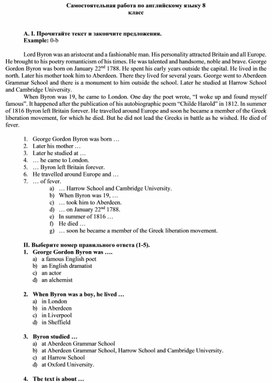Самостоятельная работа по английскому языку 8 класс
А. I. Прочитайте текст и закончите предложения. Example: 0-b
Lord Byron was an aristocrat and a fashionable man. His personality attracted Britain and all Europe. He brought to his poetry romanticism of his times. He was talented and handsome, noble and brave. George Gordon Byron was born on January 22nd 1788. He spent his early years outside the capital. He lived in the north. Later his mother took him to Aberdeen. There they lived for several years. George went to Aberdeen Grammar School and there is a monument to him outside the school. Later he studied at Harrow School and Cambridge University.
When Byron was 19, he came to London. One day the poet wrote, “I woke up and found myself famous”. It happened after the publication of his autobiographic poem “Childe Harold” in 1812. In summer of 1816 Byron left Britain forever. He travelled around Europe and soon he became a member of the Greek liberation movement, for which he died. But he did not lead the Greeks in battle as he wished. He died of fever.
1. George Gordon Byron was born …
2. Later his mother …
3. Later he studied at …
4. … he came to London.
5. … Byron left Britain forever.
6. He travelled around Europe and …
7. … of fever.
a) … Harrow School and Cambridge University.
b) When Byron was 19, …
c) … took him to Aberdeen.
d) … on January 22nd 1788.
e) In summer of 1816 …
f) He died …
g) … soon he became a member of the Greek liberation movement.
II. Выберите номер правильного ответа (1-5).
1. George Gordon Byron was ….
a) a famous English poet
b) an English dramatist
c) an actor
d) an alchemist
2. When Byron was a boy, he lived …
a) in London
b) in Aberdeen
c) in Liverpool
d) in Sheffield
3. Byron studied …
a) at Aberdeen Grammar School
b) at Aberdeen Grammar School, Harrow School and Cambridge University.
c) at Harrow School
d) at Oxford University.
4. The text is about …
a) a famous English poet
b) an English dramatist
c) a famous University
d) a famous book
5. George Gordon Byron died …
a) in battle
b) of fever
c) of tuberculosis
d) of grippe
B. Составьте словосочетания, используя слова, данные в левой и правой колонке
Example: 0-e
|
0. Conflict |
a) the wars |
|
1. reunion |
b) agency |
|
2. human |
c) along with |
|
3. prevent |
d) college |
|
4. means of |
e) resolution |
|
5. travel |
f) rights |
|
6. get |
g) party |
|
7. six form |
h) communication |
C. Дополните следующие ниже предложения, выбрав один из предложенных вариантов решения.
1. You learnt the news only yesterday, …?
a) wasn’t it
b) didn’t you
c) was it
d) did you
2. The young … respect old people.
a) must to
b) must
c) can
d) may
3. There … interesting articles in the last local newspaper.
a) is
b) isn’t
c) was
d) were
4. He … help me if he knew about my problems.
a) would
b) will
c) –
d) am going
5. He speaks English …
a) better
b) well
c) good
d) bad
6. My father … in his room now.
a) was working
b) is working
c) will be working
d) are working
7. When we came, he … the work.
a) has done
b) did
c) had done
d) does
8. America … by Columbus.
a) is discovered
b) was discovered
c) has discovered
d) is discovering
9. He said he would return the book …
a) now
b) tomorrow
c) the next day
d) yesterday
© ООО «Знанио»
С вами с 2009 года.
![]()


